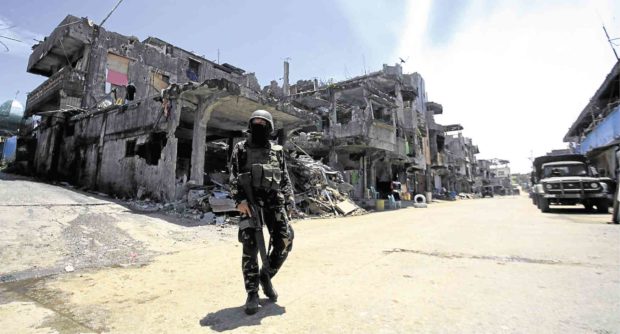
PHOTO BY RICHEL V.UMEL
Maj. Gen. Rolando Bautista, head of the Army’s First Infantry Division, tries to teach evacuees how to plant vegetables in anticipation of an end to the war that had left most of Marawi City (top photo) in ruins. Bautista oversees a “green community” plan for evacuees. —CONTRIBUTED PHOTO
ILIGAN CITY—“Martial Law” is dead.
The child born on May 23, the first day of the war in Marawi City, and named after martial law declared in Mindanao by President Duterte, had died of pneumonia in an evacuation camp for residents displaced by the fighting in the predominantly Muslim city.
Tarhata Mustari, Martial Law’s mother, said the child’s illness worsened during the family’s stay at the Iligan National School of Fisheries in the village of Buru-un in this city.
On Aug. 21, Martial Law’s health further deteriorated, according to Tarhata. At 2 a.m. of that day, the four-month-old baby convulsed.
Tarhata said she and husband, Ornagking, “summoned all the help we can possibly get.” An ambulance requested by social welfare officials came and brought Martial Law to the government-run Lluch Memorial Hospital.
Dead of pneumonia
After a week in the hospital, Martial Law died on Aug. 28. “He died of pneumonia,” Tarhata said.
“I hope my son would be the last child to die while the Maranao people are in evacuation centers,” said Tarhata, who has four other children all staying with her and her husband in the evacuation center.
Tarhata’s case could be common among evacuees.
“Life here at the evacuation center is very difficult,” Tarhata said. “Everyday, children become sick because of the condition here,” she said.
Nutrition was the main concern for children, Tarhata said.
Tarhata, like many of her fellow evacuees, found a military statement that the war is drawing to a close encouraging. But like many of the Maranaos displaced from Marawi, Tarhata didn’t see a bright future for them.
Earlier, Col. Romeo Brawner, deputy commander of the Joint Task Group Ranao, said the end of the fighting is near—“10-15 days more”—because the area in Marawi being controlled by Islamic State-affiliated gunmen had grown smaller.
“The siege will not last long,” Brawner said.
Echoing the evacuees’ sentiments, Tarhata said all she wanted was to return to her home, or what was left of it.
Since May 23, when the war started, at least 40 individuals had already died from various illnesses in evacuation camps.
Uncertain future
Evacuee Aniza Gamana, 39, a mother of five, also told the Inquirer that she would also be happy if the war was, indeed, ending.
She expressed fear, however, of what awaits her and her family in Banggolo, a village in Marawi where she lived before the war.
Evacuee Tata Sultan Malo, 50, also from Banggolo, said the end of the war would also mean problems ahead for most evacuees.
Tata said unless the government helped them rebuild their lives, the future would be bleak for them.
“We don’t want to stay in a tent city. We appeal to President Duterte to help us,” she said.
Emelita Manisan, 48, said that while evacuees were happy about the military announcement of the war ending, returning to their normal lives would be very difficult.
“Our home was destroyed and we lost our small business,” Emelita said. —ALLAN NAWAL, RICHEL UMEL AND JEOFFREY MAITEM